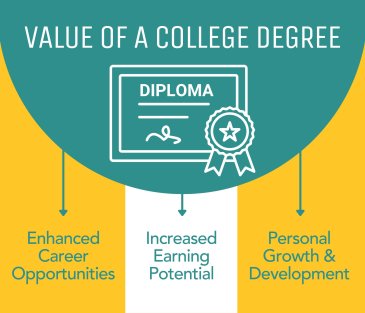
In today’s competitive job market, a college degree can significantly impact your earning potential and career advancement opportunities.
Beyond intellectual development and personal growth, earning a bachelor’s degree equips you with invaluable skills and opens doors to higher-paying jobs across various industries.
The value of a college degree
Higher education is a big investment. However, earning your bachelor’s degree can create incredible benefits in your life and career. In addition to increasing your knowledge in your chosen area of study, three key benefits of getting a bachelor’s degree are:
- Enhanced career opportunities
- Increased earning potential
- Personal growth and development
Enhanced career opportunities
A college degree can expand your career horizons by opening doors to a wide array of job opportunities. According to the Public Policy Institute of California (PPIC), college graduates are less likely to be unemployed and more likely to have full-time jobs. In 2021, an estimated 85.3% of those with a bachelor’s degree were employed, compared to 74.3% with a high school diploma.
Among full-time workers, college graduates are also much more likely to have jobs that offer health insurance, retirement, paid vacation, and flexible work arrangements. A recent survey compared college graduates’ rate of health coverage and retirement plans compared to those without a degree:
Share of Workers with Job-Sponsored Benefits
Health coverage | Retirement plan | |
Less than high school | 47% | 17% |
High school diploma | 68% | 25% |
Some college | 77% | 36% |
Associate degree | 80% | 36% |
Bachelor's degree | 86% | 43% |
Advanced degree | 90% | 46% |
According to the American Community Survey, 2021 via PPIC
Additionally, many professions today require specialized knowledge and skills that are cultivated through higher education. From engineering and healthcare to business and the arts, employers often seek candidates with a solid educational background.
Beyond specific career skills, a college education also instills essential soft skills such as critical thinking, communication, problem-solving, and teamwork — attributes highly valued in today’s workforce.
With a degree, you are better positioned to compete for high-paying, rewarding positions and are more adaptable to evolving industry commands, setting a solid foundation for a successful and fulfilling career. You can also gain eligibility for elevated salaries, promotions, and roles that might otherwise remain inaccessible. This qualification opens doors to higher earning potentials and substantial income increases over the span of your professional life.
Increased earning potential
Statistics consistently demonstrate that earning potential tends to be higher for college graduates compared to other workers. According to recent data from the National Center for Education Statistics, the nationwide median income for those with a bachelor’s degree ($61,600) was 55% higher than those who had completed high school.
In California, the average salary is even higher. According to the Public Policy Institute of California, “California workers with a bachelor’s degree earn a median annual wage of $81,000.” In contrast, only 12% of workers with a high school diploma earn that much.
This higher earning potential not only improves an individual’s financial stability but also contributes to long-term economic security. According to the Federal Reserve, two-thirds of graduates from private not-for-profit and public institutions said they believe the financial gains from their education outweigh the incurred costs. The investment made in higher education often yields substantial returns in their long-term careers.

Personal growth and development
A college education isn’t solely about securing a job or a higher salary — it’s an enriching experience that fosters personal growth and development. Higher education:
- Encourages intellectual curiosity
- Broadens perspectives
- Nurtures critical thinking skills
A college’s environment introduces students to diverse cultures, ideas, and people, promoting social and cultural awareness. Moreover, it helps individuals hone their analytical abilities, refine their communication skills, and develop a strong work ethic. In career terms, this can translate into a greater sense of confidence and enthusiasm in your field of interest.
Through academic challenges, extracurricular activities, and interactions with peers and mentors, you can acquire valuable life skills that extend far beyond the confines of a classroom. This can help you become a well-rounded and adaptable individual poised for success in various aspects of life.
______
Who are you called to be?
Pursue your purpose at PLNU.
______
Where to find information on specific careers
When considering whether to pursue education, you’re doubtless going to ask questions like:
- Whether you should attend
- Where to enroll
- What major to pursue
- Which career goals you should pursue
If you’re interested in learning about the educational requirements for potential careers, check out the following resources:
- Schedule an appointment with PLNU’s Career Services
- Seek career mentorship within the PLNU community through the university’s Alumni Association
- Use the U.S. Bureau of Labor Statistics (BLS) Occupational Outlook Handbook for information on specific industries and occupations
- Check out Indeed’s guide “How to Research Career Paths in 8 Steps”
Level up your career at PLNU
If you’re looking to take the first step toward a rewarding future, check out Point Loma Nazarene University’s undergraduate, graduate, and accelerated undergraduate programs.